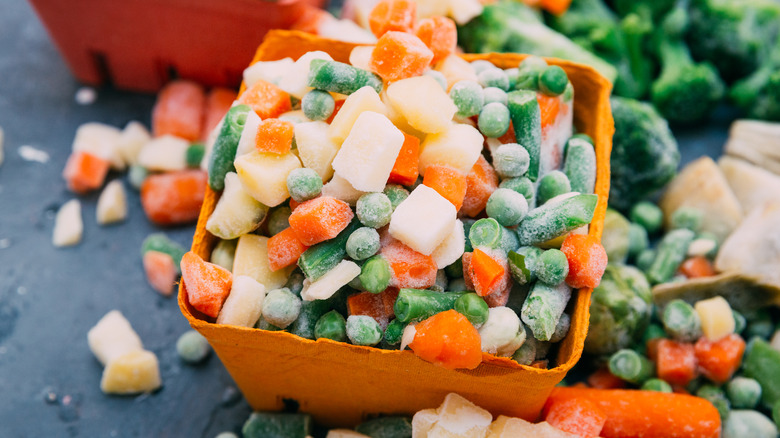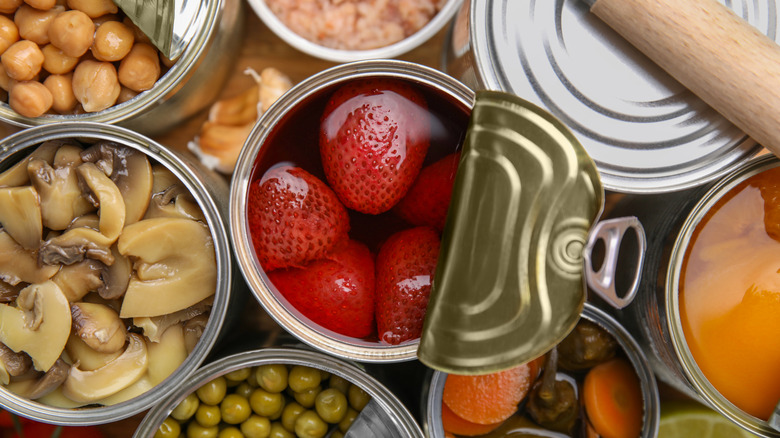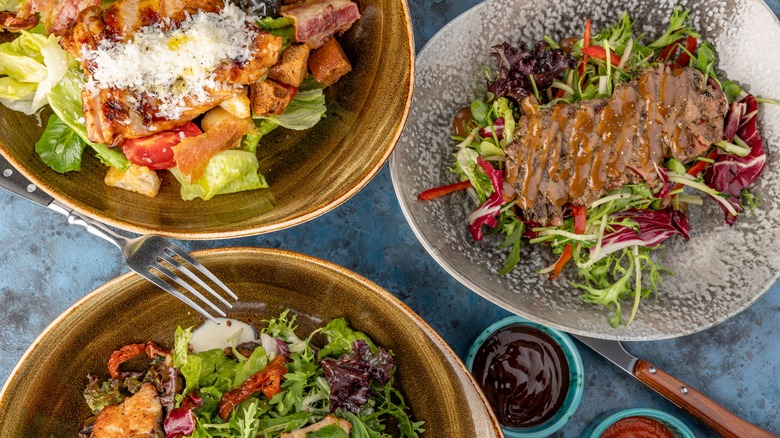Do Whole Foods Still Count If They're Canned Or Frozen?
Between all the diet fads, health trends, and pseudoscience on social media, it can be hard to discern what is most essential for those trying to live a healthy lifestyle. A term that comes up frequently in discussions about nutrition is "whole foods," but what is a whole food? Basically, whole foods are fruits, vegetables, proteins, grains, legumes, and dairy that are as close to how they come out of the ground or animal as possible. They have not gone through processing and do not contain added ingredients — think fruits and vegetables in their original form. However, it is no surprise that fresh produce can sometimes be prohibitively expensive, of varying quality, and too time-consuming to prepare. You may turn to canned or frozen foods in these cases, but do they still count as whole foods? Well, not technically, but that shouldn't scare you away.
When a fruit or vegetable is frozen, there is a negligible loss of nutrients. However, the longer they are frozen, the greater the loss of vitamins and minerals, so it is best to consume them within eight months. Canned goods lose a bit more nutrients but, truly, a canned green bean is way better than no green bean at all. Just take a look at the label and opt for a product with little to no added sugar or salt. If you find frozen or canned produce to be more accessible, affordable, or tastier, you can still be confident that they are good for you.
Processed vs. minimally processed vs. ultra-processed
The opposite of a whole food is a processed food, and that term can definitely set off alarm bells. However, any food that goes through steps to change it from its original form is a processed food. That category includes some obvious items like candy, soda, frozen pizza, and deli meats, but it also includes foods that may not immediately come to mind, like whole wheat flour, pre-washed lettuce, par-cooked brown rice, plain yogurt, cheese, and canned and frozen fruits and vegetables.
Processed food is an umbrella term. The distinction to make here is between ultra-processed and minimally processed foods. Ultra-processed foods have long ingredient lists, lots of additives and preservatives, and artificial ingredients. These foods don't have high nutritional value. Minimally processed foods are treated so that they can be easier to eat or digest by doing things like: "cleaning and removing inedible or unwanted parts, grinding, refrigeration, pasteurization, fermentation, freezing, and vacuum-packaging," as noted by the Harvard T.H. Chan School of Public Health. Milk, nuts, pasta, tea, coffee, raw meats, pre-cut produce, and whole grains like oats, bulgar wheat, quinoa, and popcorn are all examples of minimally processed foods.
A diet consisting mainly of unprocessed and minimally processed foods is ideal when it comes to preventing chronic diseases, boosting immunity, and maintaining an overall healthy lifestyle, according to Everyday Health. However, taking this to the extreme by shaming yourself for eating ultra-processed foods or unsustainably restricting your choices is not ideal either.
It's all about balance
The point of prioritizing eating whole foods is to plan and create balanced meals that work for your preferences, body, culture, and budget. Incorporating more whole and minimally processed foods is great, but don't get obsessive. Sure, dry beans go through less processing than canned beans, but if you don't have time to cook them, canned beans still offer tons of fiber, protein, and nutrients for a fraction of the preparation time.
A salad can be a great choice when loaded with an array of multi-colored vegetables (including underrated frozen vegetables), satiating ingredients like canned garbanzos and cooked whole grains, lean protein like boiled eggs, grilled chicken, or tinned fish, and healthy fats from cheese, avocado, and nuts or seeds. However, a store-bought salad dressing may be loaded with sugar, sodium, and preservatives. Making your own dressing means you can choose exactly what goes into it.
Focus on doability. If you know that you are more likely to eat whole foods with glee when topped with your favorite brand of store-bought dressing, there is nothing wrong with that. You may consider opting for a brand that prioritizes whole foods and a short ingredients list or batch-prepare a homemade dressing for the week to make your life a little easier. However, adding dressing does not eliminate the healthy qualities and, in fact, fats in the dressing can help you better absorb the nutrients in the salad.



